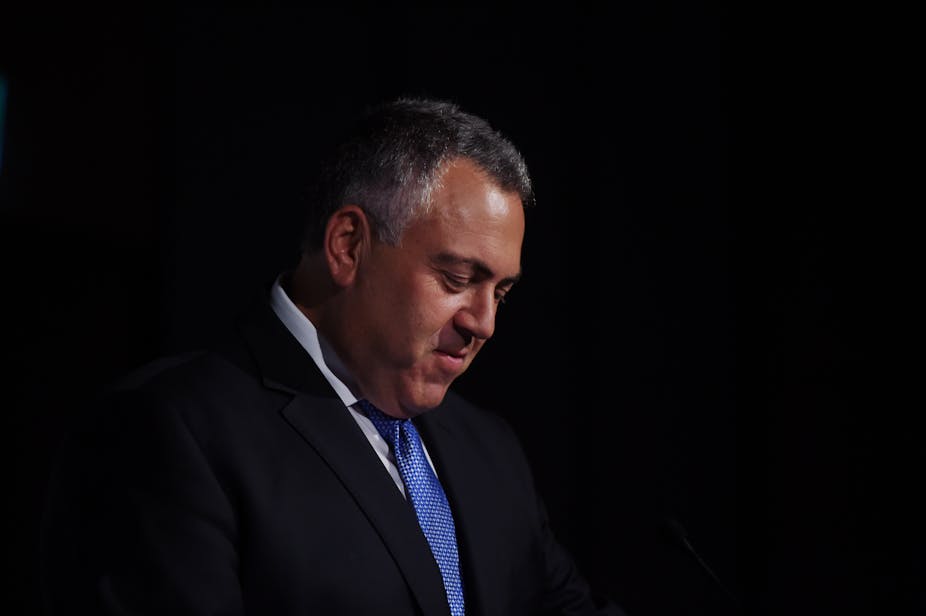As it prepares to release the Intergenerational Report and put together its second budget, the Abbott government is headed into a perfect storm.
It has minimal political capital. The futures of the prime minister and treasurer hang by a thread. The polls are bad and the backbench skittish. A politically smelly bundle of baggage remains from the 2014 budget. And the economy is somewhat worse than might have been expected.
Joe Hockey is asking the Australian public to lift their eyes from the here-and-now and look a few decades on. But, in light of the politics, he and Tony Abbott will have to be thinking about a very short timeframe.
Hockey said on Thursday that the Intergenerational Report (IGR) – “a compact between the generations” – is different from previous ones.
“It is a very genuine attempt by the Treasury, in an unprecedented way, to launch a conversation about Australia’s future,” Hockey told the NSW Business Chamber.
“It will be a genuine community conversation about actions that not only protect our current way of life, but protect it for the next generation, and the next, and the next.”
Let’s not dispute that good policy needs to look to the future. Let’s not deny that an ageing population, economic and fiscal trends, and past spending and revenue decisions present serious challenges. But let’s also have a reality check on the treasurer’s rhetoric.
The government proposes an interactive advertising campaign to get public feedback after the IGR’s release, expected in the first week of March.
Asked about the detail, the treasurer’s office said there will be “an information campaign to ensure everyone has access [to the IGR material]”. It will “call for the community to give us their views on how to address the challenges we face”.
Is this a mini-version of what Campbell Newman had around his “Queensland plan”? That didn’t do him much good.
The trouble is the government has poisoned the well. People may just view the “conversation” as a stunt, apart from the predictable controversy about spending public money on it. Having exaggerated both the extent of the fiscal crisis and its ability to chart a credible path to surplus, the government is likely to find suspicion of whatever it says.
The other difficulty is that while people do think about the future for their children, they also apply a discount the further they gaze down the time tunnel. For example, when they’re confronted with a co-payment, backed by the argument that a price signal will help make Medicare sustainable, they think about the current pain rather than a later problem.
And politics increasingly plays to the present not the future. That’s certainly the case with the Senate crossbench, which has left the government with hard decisions to make within weeks on items it can’t get through parliament.
These include the Medicare price signal, a welfare crackdown for young people and future pension changes. If it abandons these, the government won’t just be denying the message of the IGR but, more to the immediate point, taking billions of “savings” (albeit notional) out of its budget forward estimates. No wonder Hockey wants to keep the measures in play.
Abbott has reassured the public the 2015 budget won’t be hard on households, like the last one was. He knows that politically it can’t afford to be, while economically a fragile economy must be treated with care.
Meanwhile, Abbott will try to make the government more voter-friendly with a childcare package set to cost money rather than save it.
Even this contains a test for the government. The Productivity Commission has recommended childcare benefits be combined into a single, means-tested payment, which would reduce – though not eliminate – the current subsidy for higher-income families.
The government is damned either way. Cutting the subsidy for wealthier people would be politically unpopular with many voters. The government could justify rejecting that by saying it wanted to encourage, not discourage, female participation in the workforce – but this would open it to the criticism it wasn’t fair dinkum about containing big spending programs.
Saul Eslake, chief economist with Bank of America Merrill Lynch, says that given the weaknesses in economic growth, it is right for the government in the coming budget to allow the deficit to blow out somewhat in the short term.
But Eslake says the government needs to chart a longer-term path back to surplus and if it is to avoid “unfairness” (the charge levelled against the 2014 budget) that requires knocking out some concessions and loopholes enjoyed by higher-income earners.
“The long-term problem with the budget is arguably more on the revenue side than on the spending side,” Eslake says. “Government spending is 1% of GDP above the average for the Howard years. Revenue is 2.25% of GDP below the average of the Howard years.”
Eslake nominates among areas that should be looked at superannuation tax breaks, negative gearing, the capital gains tax discount and the use of trusts. Inclusion of the family home in the assets tests for the pension (prospectively, not for current pensioners) also should be considered, he says.
The government’s sensitivity was obvious this week from its response to a report that the latter measure was being discussed. Social Services Minister Scott Morrison blitzed the media to rule out any such move.
Apart from anything else, speculation about including the family home in the pension assets test would have been highly damaging in the run-up to the late-March NSW election.
The result in that state will be another factor potentially feeding into the budget preparation. A hefty swing against the Baird government – which is running partly on the unpopular issue of privatising poles and wires – would further destabilise Abbott.
By the way, in Canberra they’re looking at some privatisation too. They are thinking of selling the Treasury building. No, that is not a joke.

